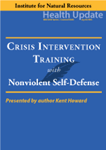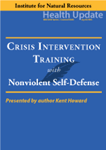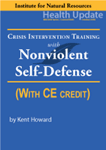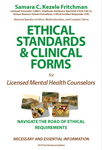You have no items in your shopping cart.
Ethics
Crisis Intervention Training with Nonviolent Self-Defense - DVD - 2 Hours (w/Home-study exam)
In this DVD presentation, Master Instructor Kent Howard will guide the viewer through basic methods of self-protection, retreat, and escape. He will demonstrate skills to deal with seizures and strikes. Finally, he will describe how to engage, control, and restrain an angry or aggressive client. This course will satisfy 2 contact hours in Category 5 for patient safety for pharmacist and pharmacy technician credits.
After completing this course, participants will be able to 1) describe strategies for self-protection, retreat, and escape, 2) demonstrate core skills for defense against seizures and strikes, 3) describe how to engage and gain control over a client who is acting out; and 4) explain the role of self-defense and humane care in crisis intervention.
After completing this course, participants will be able to 1) describe strategies for self-protection, retreat, and escape, 2) demonstrate core skills for defense against seizures and strikes, 3) describe how to engage and gain control over a client who is acting out; and 4) explain the role of self-defense and humane care in crisis intervention.
$49.00
Crisis Intervention Training with Nonviolent Self-Defense - DVD only *NO CE - 2 hours
In this DVD presentation, Master Instructor Kent Howard will guide the viewer through basic methods of self-protection, retreat, and escape. He will demonstrate skills to deal with seizures and strikes. Finally, he will describe how to engage, control, and restrain an angry or aggressive client. This course will satisfy 2 contact hours in Category 5 for patient safety for pharmacist and pharmacy technician credits.
After completing this course, participants will be able to 1) describe strategies for self-protection, retreat, and escape, 2) demonstrate core skills for defense against seizures and strikes, 3) describe how to engage and gain control over a client who is acting out; and 4) explain the role of self-defense and humane care in crisis intervention.
After completing this course, participants will be able to 1) describe strategies for self-protection, retreat, and escape, 2) demonstrate core skills for defense against seizures and strikes, 3) describe how to engage and gain control over a client who is acting out; and 4) explain the role of self-defense and humane care in crisis intervention.
$39.00
Crisis Intervention Training with Nonviolent Self-Defense - Streaming Video - 2 Hours (w/Home-study exam)
In this DVD presentation, Master Instructor Kent Howard will guide the viewer through basic methods of self-protection, retreat, and escape. He will demonstrate skills to deal with seizures and strikes. Finally, he will describe how to engage, control, and restrain an angry or aggressive client. This course will satisfy 2 contact hours in Category 5 for patient safety for pharmacist and pharmacy technician credits.
After completing this course, participants will be able to 1) describe strategies for self-protection, retreat, and escape, 2) demonstrate core skills for defense against seizures and strikes, 3) describe how to engage and gain control over a client who is acting out; and 4) explain the role of self-defense and humane care in crisis intervention.
After completing this course, participants will be able to 1) describe strategies for self-protection, retreat, and escape, 2) demonstrate core skills for defense against seizures and strikes, 3) describe how to engage and gain control over a client who is acting out; and 4) explain the role of self-defense and humane care in crisis intervention.
$49.00
Crisis Intervention Training with Nonviolent Self-Defense - Streaming Video only *NO CE - 2 hours
In this DVD presentation, Master Instructor Kent Howard will guide the viewer through basic methods of self-protection, retreat, and escape. He will demonstrate skills to deal with seizures and strikes. Finally, he will describe how to engage, control, and restrain an angry or aggressive client. This course will satisfy 2 contact hours in Category 5 for patient safety for pharmacist and pharmacy technician credits.
After completing this course, participants will be able to 1) describe strategies for self-protection, retreat, and escape, 2) demonstrate core skills for defense against seizures and strikes, 3) describe how to engage and gain control over a client who is acting out; and 4) explain the role of self-defense and humane care in crisis intervention.
After completing this course, participants will be able to 1) describe strategies for self-protection, retreat, and escape, 2) demonstrate core skills for defense against seizures and strikes, 3) describe how to engage and gain control over a client who is acting out; and 4) explain the role of self-defense and humane care in crisis intervention.
$39.00
Ethical Standards & Clinical Forms *NO CE
This useful and practical book is designed specifically for all licensed mental health professionals. The author, Samara, has spoken nationally for many years on the topics relevant to ethics and mental health. This book will help you sort out fact from fiction, ethical standards from legal issues, and their practical applications in clinical practice. You will gain an understanding of and an appreciation for the purpose and necessity of ethical standards. Competence, within the field of counseling psychology, is important because the information available to practicing counselors is constantly growing and changing.
$44.00
Medical Ethics
Identifies and discusses the principles of medical ethics. Defines and distinguishes between ethics, morals, and values. Identifies the ethical obligations in a clinician-patient relationship. Explains the issues surrounding patient consent, including informed consent, voluntary consent, and competent consent. Discusses ethical principles in preserving patients’ confidentiality, including the requirements of the Health Insurance Portability and Accountability Act (HIPAA). Explains the legal documents that apply to end-of-life health care decisions and the ethical principles that apply to the right-to-die controversy. Identifies the core values and code of ethics as they should be applied within the medical professions.
$30.00
Medical Ethics - Ebooklet
Identifies and discusses the principles of medical ethics. Defines and distinguishes between ethics, morals, and values. Identifies the ethical obligations in a clinician-patient relationship. Explains the issues surrounding patient consent, including informed consent, voluntary consent, and competent consent. Discusses ethical principles in preserving patients’ confidentiality, including the requirements of the Health Insurance Portability and Accountability Act (HIPAA). Explains the legal documents that apply to end-of-life health care decisions and the ethical principles that apply to the right-to-die controversy. Identifies the core values and code of ethics as they should be applied within the medical professions.
$25.00







